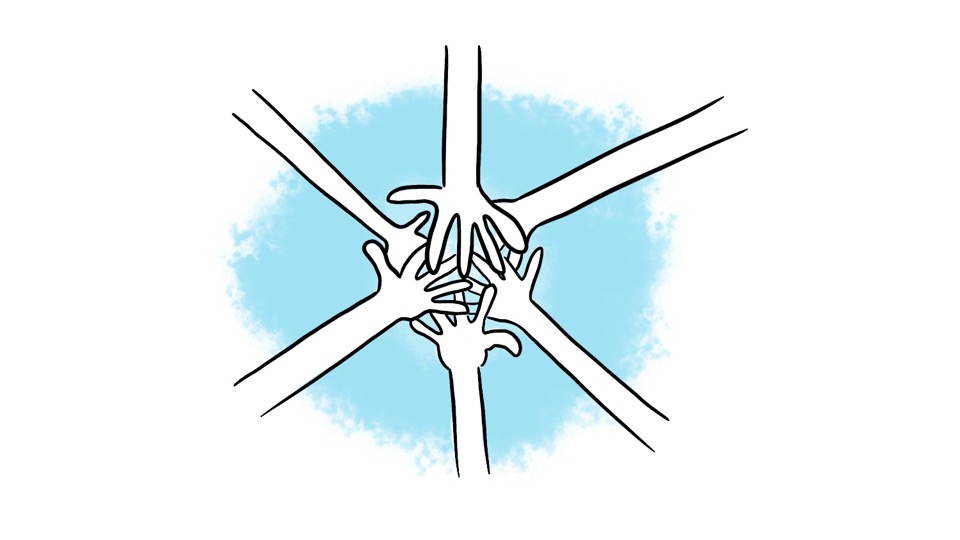
…….work with a Miro , Padlet or Canva- tool, the answer is YES. In the beginning of this course my personal aim was to learn more digital tools and be brave enough to use them in my courses with students. What I learnt was how a group collaborate when the level of digital literacy differs. This experience is impossible to achieve without participation. My digital literacy increased but mainly the list of available tools, slightly better understanding of how they can be used but none or few of their special functions. I have used all the tools in a similar way , as a digital blackboard where I also could be helped with templets and include my voice and pictures. I still miss basic knowledge on how to set up, invite and develop learning by these tools beyond the smart board I also have in my lecturing room. Next level would be to sort, organize and make data available to a group by the smart functions in these tools.
We are a group of ONL-members that are going to start up an ONL with topics on sustainable development. Many of them are experienced and I feel well taken care of in continuing my digital journey. To summarize this course, I choose to write two lists, first is my “take home message list” and under that the list of “still challenges” for online courses. These are my learnings and valuable insights that will be used in setting up the new ONLY Education for Sustainable development. If you are interested in taking part, please comment this post and I will keep you updated!
Take home message:
- Working PBL is very stimulating and the social aspects of getting to know each other cannot be underestimated as a factor effecting learning and engagement.
- Working PBL affect the way I read literature, I read less but more carefully since I know I have to share with my group.
- The scenarios we will write on education for sustainable development have to include perspectives where emotions, feelings and cultural background are part of the learning journey. .
- Creative commons and licensed material were new knowledge to me and very important to learn, I have to learn more, but now I know where to find material and instructions.
- Self-efficiency is important and some students will need help in the beginning of the ONL journey to avoid drop outs.
- Universities find ONL cost effective and the balance of high quality and effective education has to be met by us organizing and teaching the courses online.
Challenges:
- I need to find good methods or tools that enable reading other individuals work, I found I produced text in this course, but mainly learnt by listening and taking part in discussions from others. What the other individuals contributed in text had low focus due to time for me.
- I have to train setting up, inviting and giving instructions about the tools we will use. That might sound very basic although it is but very important to be skilled in if I will run my own course. I will also choose a few tools that participants get acquainted with rather than a broad span of tools. One for communication, one for collaboration and one for reporting is enough.
- We have to find ways doing things digital that is not based on how we do things physical. I especially think of producing text together in real time, making the discussions and collaborations online the outcome of learning and not merely preparations of learning. I think of inviting more voices and places in learning that was not earlier possible, to see with your own eyes, compare and understand by being “online physical” is a challenging thought.
- Working ONL does not differ from IRL work in that the work load amongst the participants will become uneven due to digital literacy, timeframes and engagement. Eager learners are to be welcomed in the community of ONL to make their efforts bring back experience of being in the community.
- Examination online is a challenge and something we never spoke about in our group.
Thank you ONL 221, especially group 4, ONL4you, facilitators Viveca and Oksana for this experience, this is the start of my digital journey in making courses at University!
Gokhan Alcan
May 22, 2022 — 3:32 pm
You really made a nice concrete summary of what we did and I 100% agree with your take-home messages. The online examination would be indeed a nice topic to discuss in our group. Maybe it could be a nice alternative topic for next year’s ONL groups 🙂 Thank you, Anna, wish you the best!
Oksana
May 30, 2022 — 7:56 am
Dear Anna, thank you very much for your great insights! Your take-home messages are absolutely relevant as we do need time and consideration to digest what we have learned from each other. It is a great pleasure for me to accompany you on your learning journey! Let’s live and learn together!